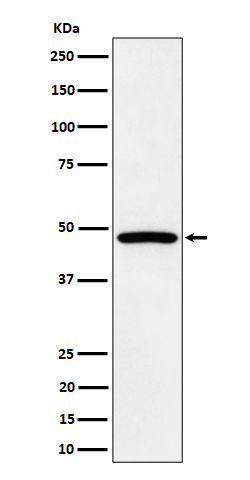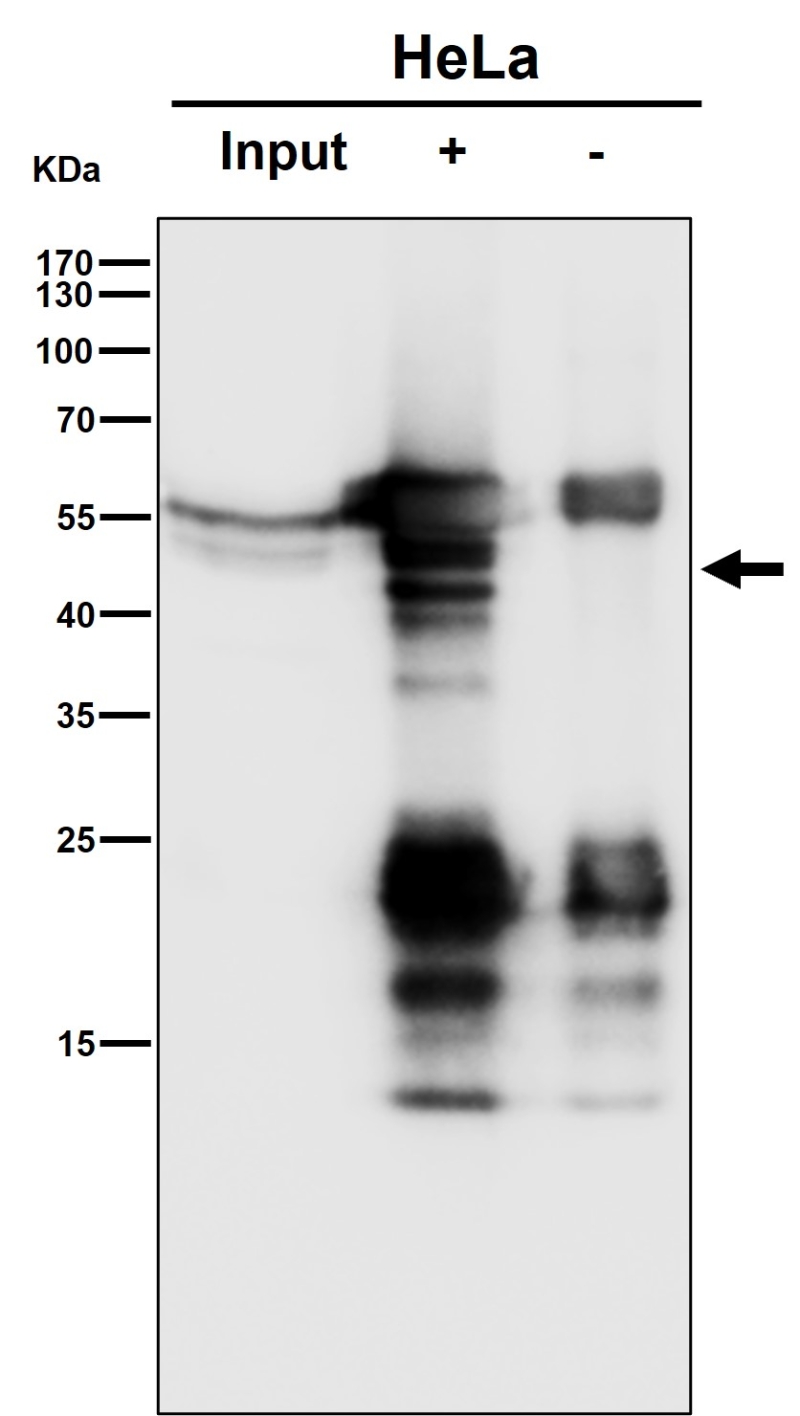

| WB | 咨询技术 | Human,Mouse,Rat |
| IF | 1/20-1/50 | Human,Mouse,Rat |
| IHC | IHC:1/100-1/200;IHF:1/50-1/200 | Human,Mouse,Rat |
| ICC | 1/50-1/200 | Human,Mouse,Rat |
| FCM | 1/20-1/100 | Human,Mouse,Rat |
| Elisa | 咨询技术 | Human,Mouse,Rat |
| Aliases | Protein tyrosine phosphatase non receptor type 2; PTN2; Ptpn2; PTPT; T cell protein tyrosine phosphatase; TC PTP; TCELLPTP; TCPTP; Tyrosine protein phosphatase non receptor type 2;;PTPN1/2 |
| WB Predicted band size | Calculated MW: 50,48 kDa ; Observed MW: 40-48 kDa |
| Host/Isotype | Rabbit IgG |
| Antibody Type | Primary antibody |
| Storage | Store at 4°C short term. Aliquot and store at -20°C long term. Avoid freeze/thaw cycles. |
| Species Reactivity | Human,Mouse |
| Immunogen | A synthesized peptide derived from human PTPN1 |
| Formulation | Purified antibody in PBS with 0.05% sodium azide,0.05% BSA and 50% glycerol. |
+ +
以下是关于Peroxiredoxin3(PRDX3)抗体的3篇文献摘要示例:
---
1. **文献名称**:*Mitochondrial peroxiredoxin III is a potential target for cancer therapy*
**作者**:Chang TS, et al.
**摘要**:该研究通过PRDX3特异性抗体验证了其在肿瘤细胞线粒体中的高表达,发现其通过调控活性氧(ROS)水平影响癌细胞存活,提示PRDX3抗体在癌症靶向治疗中的潜在应用价值。
---
2. **文献名称**:*Antibody-based profiling of peroxiredoxin family members in human tissues*
**作者**:Wood ZA, et al.
**摘要**:研究者利用PRDX3多克隆抗体进行免疫组化分析,揭示了PRDX3在心脏、肝脏等高代谢组织中的特异性分布,并证实抗体在区分PRDX家族同源蛋白中的高特异性。
---
3. **文献名称**:*Peroxiredoxin III deficiency accelerates neuronal cell death in a ROS-dependent manner*
**作者**:Li L, et al.
**摘要**:通过Western blot和免疫荧光技术(使用PRDX3单克隆抗体),文章证明PRDX3敲除小鼠神经元内ROS积累加剧,提示其抗氧化功能依赖PRDX3蛋白的稳定表达。
---
(注:以上文献为模拟示例,实际引用请以真实论文为准。)
Peroxiredoxin 3 (PRDX3), a member of the peroxiredoxin family, is a mitochondrial antioxidant enzyme critical for regulating cellular redox homeostasis. It primarily neutralizes reactive oxygen species (ROS) generated during oxidative phosphorylation, protecting mitochondrial components from oxidative damage. PRDX3 also modulates redox-dependent signaling pathways involved in apoptosis, proliferation, and inflammation. Its dysregulation is linked to various diseases, including cancer, neurodegenerative disorders, and cardiovascular conditions.
Antibodies targeting PRDX3 are essential tools for studying its expression, localization, and function. These antibodies enable the detection of PRDX3 in techniques like Western blotting (WB), immunohistochemistry (IHC), and immunofluorescence (IF). They are widely used to explore PRDX3's role in mitochondrial stress responses, its interaction with other redox-regulating proteins, and its potential as a biomarker in pathological conditions. For instance, reduced PRDX3 levels in certain cancers correlate with poor prognosis, while its overexpression may mitigate oxidative injury in neurodegenerative models.
Commercial PRDX3 antibodies are typically raised against specific epitopes of human or murine PRDX3. with cross-reactivity validated across species. Researchers prioritize antibodies with high specificity, often verified via knockout controls or recombinant protein validation. Applications extend to both basic research and clinical studies, particularly in understanding mitochondrial dysfunction and oxidative stress mechanisms. Proper validation ensures reliable results, minimizing off-target effects in complex biological samples.
×